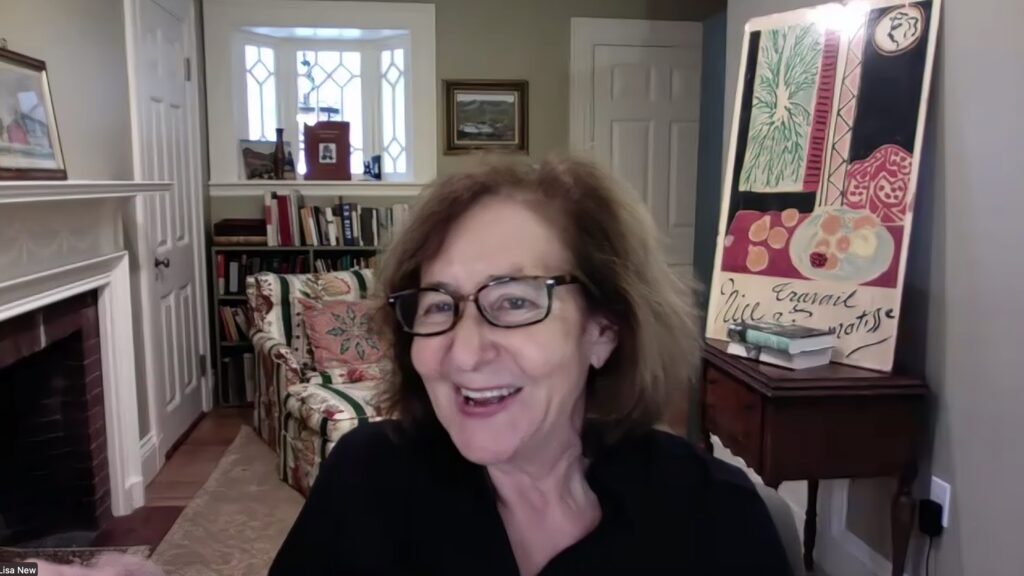The World is Her Classroom: Lisa New’s Aspire Masterclass Bridges Continents with Poetry

Lisa New, Harvard professor and creator of Poetry in America, leads a powerful Masterclass for the Aspire Leader Program. This virtual session brings American poetry analysis to a global audience, fostering leadership development through the humanities.
How does reading poetry make you a better leader?
This question was on the minds of the more than 1200 young adults from 69 countries participating in a Masterclass as part of the Aspire Leaders Program, who recently gathered from the far ends of the earth to read and reflect on a poem with Poetry in America’s Elisa New.
The Aspire Leaders Program is a free, nine-week, online leadership development program that empowers limited-income and first-generation college students and recent graduates around the world. Offered by Aspire Institute, a nonprofit organization founded by Harvard Business School professors, the program allows learners to realize their strengths and change the trajectory of their lives and communities. Learners participate in professional development workshops made in collaboration with Harvard Business School Career Services, engage in networking opportunities with peers from around the globe and take part in live sessions led by world-class educators.
Professor New introduced herself to the students by explaining that she began her career teaching in Philadelphia at the University of Pennsylvania, before moving to Harvard in 1989, where she taught American literature for 20 years before retiring from full-time teaching. “My favorite classes, the ones I really enjoyed teaching, were when students had to fill a requirement,” she said. “Whatever university or college you’re studying at right now, there are probably courses that are required of you, and you probably go in suspicious of them or maybe not liking them, just because they are required. Students at Harvard were all required, and still are, to do something in the arts or humanities. I taught a course called “Poetry in America” that served those students. The challenge was to take a subject that students thought they would not like, that they might have thought was a waste of time, and make them love it.”
With students hailing from Zimbabwe, Uganda, Peru, Ghana, Indonesia, Bolivia, Turkey, Zambia, Zimbabwe, Botswana, Sri Lanka, India, Bangladesh, Kenya, Angola, Dominican Republic, Iraq, Nigeria, Liberia, Syria, Afghanistan, Pakistan, Tanzania, Brazil, Haiti, South Sudan, Somalia, Sudan, Ethiopia, Egypt, Cameroon, South Africa, Rwanda, Jordan, Germany, Mexico and the United States, among many others, that challenge presented itself again.
New selected Robert Lowell’s poem “July in Washington,” featured on Poetry in America’s Season 4, available to stream for free here. Episode guests include: political consultant David Axelrod, journalists Andrea Mitchell and Justin Worland, professors Sir Jonathan Bate of Arizona State University and Kay Redfield Jamison, Johns Hopkins School of Medicine, along with writer, editor Bill Kristol and former Congressional speechwriter Sean Satterthwaite.
Even over Zoom, the professor’s passion was infectious. She shared her toolkit of tricks for reading poetry, beginning with a simple but powerful step: let your imagination lead the way. “Poetry is a form of transportation,” New enthused. “It is a way to use your mind to go somewhere else. Emily Dickinson called it flying.”
“Lowell’s poem is about 60 years old, but it could have been written yesterday,” she said. “The poem raises fascinating questions about how all nations and their leaders exert and express power. Lowell’s images in that poem convey the many subtle ways—through statuary and architecture, through landscaping and city planning—that capital cities project their importance.”
New asked the students to consider the monuments in their capital cities. What idealism do human beings build into their cities? A young woman from Egypt said she had recently visited Luxor, impressed by the contradiction that surrounded her: The grandeur of Ancient Egypt now lay in ruins. There was no one to witness its greatness. “Today’s victors are tomorrow’s dust,” New said. “All things pass.”
So, how does reading poetry help shape better leaders?
“Great poetry exposes us to human language operating at the highest levels, and thus reminds us of our own complexity, and the complexity of our world,” said New. “Since almost any uttered or written word, phrase, sentence, or line will have multiple connotations – shifting with context or medium, depending on speaker and audience, conjuring visual and aural and tonal associations that make us feel things – leaders who read poetry have a tool for much better and more truly understanding those they lead.”
If this sparked your curiosity, or you want to improve your leadership skills, take the next step: explore all four seasons of Poetry in America, where 36 more poets are waiting to be discovered.
